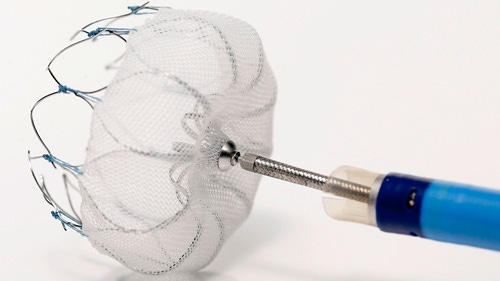Boston Scietific has had a good 2013 and is closing the year with news that its once-rejected left atrial appendage closure device may soon win FDA approval.
December 12, 2013

The Watchman Left Atrial Appendage Closure Device |
It’s been a tough road for Boston Scientific these past few years with news of repeated restructurings and falling stock prices, and it’s hard to imagine it scoring a technological first in anything.
However the company, which has had a good 2013, may be the first to emerge as a player in the U.S. left atrial appendage closure market following a positive FDA panel review of its Watchman Device on Wednesday, believes JPMorgan healthcare analyst Michael Weinstein.
In a research note, Weinstein pointed out that the FDA panel voted 13-1 in favor of approving the device. In 2009, the panel was not nearly as unanimous in recommending the device. The FDA ultimately rejected it.
The positive vote came even though data presented was less-than-complete.
“Several panelists took issue with the incomplete data available from the PREVAIL trial, with 18- month follow-up available on only 28% of patients,” Weinstein wrote.
Ultimately, however, the potential benefits of the device meant for a certain segment of atrial fibrillation patients outweighed the risks.
“We are pleased with the outcome of today's Panel, which represents an important milestone toward making this innovative technology available to patients with AF at higher risk for stroke who need an alternative to long-term warfarin therapy," said Kenneth Stein, Chief Medical Officer, Cardiac Rhythm Management, Boston Scientific, in a news release. "We appreciate the opportunity to present our comprehensive data supporting the Watchman technology and look forward to continuing discussions with the FDA regarding the Panel's comments."
While an FDA approval is now widely expected - the agency typically follows panel recommendations - Weinstein believes there are two issues that need to be resolved before that can happen.
One is the structure of a post-approval study, while the second is on an indication - Boston Scientific intends to present the device as a “second line therapy for atrial fibrillation patients who are eligible for warfarin but the proposed language was somewhat vague and there was little clarity on how physicians should select which patients are appropriate for the procedure,” Weinstein wrote.
If the FDA does approve the device, it will come roughly nine years after the product won CE Mark in Europe in 2005.
The product when approved will also give Boston Scientific a significant head start in the U.S. over St. Jude Medical, which is currently enrolling patients for its counterpart to the Watchman device, Weinstein noted.
The market opportunity is fairly large - while Boston Scientific puts it at $200 million by 2017, Weinstein chose a more conservative number - $105 million by 2017.
The positive panel vote also continues the narrative of a Boston Scientific business turnaround, even as the company has trimmed its workforce by several thousands over the past few years.
This is “another step in the right direction” wrote Glenn Novarro, senior analyst with RBC Capital Markets. in a research note discussing the favorable panel vote.
“We believe BSX has one of the best pipelines in MedTech. Over the past three years, the company (via acquisitions) has put together an impressive pipeline … [which] could add $1.3+ billion incremental revenues by 2017,” Novarro wrote.
[Image Courtesy of Boston Scientific]
-- By Arundhati Parmar, Senior Editor, MD+DI
[email protected]
You May Also Like


